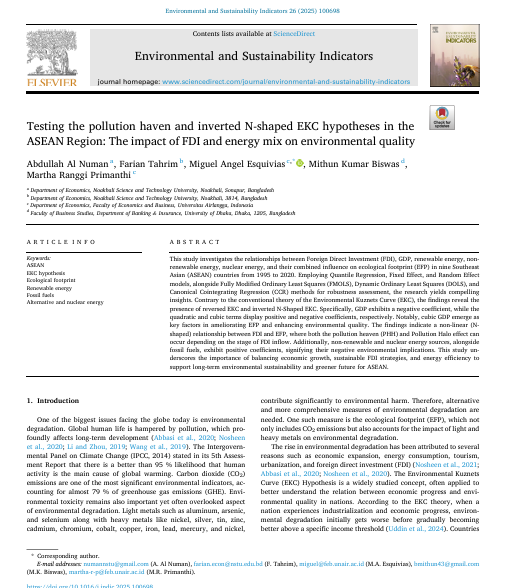
Keyword(s)
Author(s)
Abdullah Al Numan, Farian Tahrim, Miguel Angel Esquivias, Mithun Kumar Biswas, Martha Ranggi Primanthi
Country(ies)
Publisher
Published Date
Access
DOI
1. Department of Economics, Noakhali Science and Technology University, Noakhali, Sonapur, Bangladesh
2. Department of Economics, Noakhali Science and Technology University, Noakhali, 3814, Bangladesh
3. Department of Economics, Faculty of Economics and Business, Universitas Airlangga, Indonesia
4. Faculty of Business Studies, Department of Banking & Insurance, University of Dhaka, Dhaka, 1205, Bangladesh
This study investigates the relationships between Foreign Direct Investment (FDI), GDP, renewable energy, non-renewable energy, nuclear energy, and their combined influence on ecological footprint (EFP) in nine Southeast Asian (ASEAN) countries from 1995 to 2020. Employing Quantile Regression, Fixed Effect, and Random Effect models, alongside Fully Modified Ordinary Least Squares (FMOLS), Dynamic Ordinary Least Squares (DOLS), and Canonical Cointegrating Regression (CCR) methods for robustness assessment, the research yields compelling insights. Contrary to the conventional theory of the Environmental Kuznets Curve (EKC), the findings reveal the presence of reversed EKC and inverted N-Shaped EKC. Specifically, GDP exhibits a negative coefficient, while the quadratic and cubic terms display positive and negative coefficients, respectively. Notably, cubic GDP emerge as key factors in ameliorating EFP and enhancing environmental quality. The findings indicate a non-linear (N-shaped) relationship between FDI and EFP, where both the pollution heaven (PHH) and Pollution Halo effect can occur depending on the stage of FDI inflow. Additionally, non-renewable and nuclear energy sources, alongside fossil fuels, exhibit positive coefficients, signifying their negative environmental implications. This study underscores the importance of balancing economic growth, sustainable FDI strategies, and energy efficiency to support long-term environmental sustainability and greener future for ASEAN.